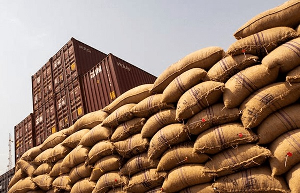The Council for Scientific and Industrial Research- Animal Research Institute (CSIR-ARI) in collaboration with the Ministry of Food and Agriculture (MoFA) in the Kassena-Nankana Municipality (KNM) has launched a small ruminant’s innovation platform.
The platform would afford producers and buyers of livestock the opportunity to brainstorm on structures needed, for the small ruminant value chain to pick up, for small ruminant rearers to increase access to health care for animals and facilitate information flow between actors in the livestock business.
The seven-member Executive Committee, which constituted the platform include: Mr Edward Chanagia as Chairman, Mr Mandela Abalore, Vice Chairman, Mr Abdul-Baqi Alhassan Secretary, Madam Mary Akolgo, Vice Secretary, Mr Gabriel Abadu, Organizer, Mr Felix Tangomse, Vice Organizer and Madam Herrienta Agwe, Treasurer.
Addressing actors in the small ruminant value chain at the launch of the platform in Navrongo, the Kassena-Nankana Municipal capital of the Upper East Region, Dr Franklin Avornyo, the Head of the Nyankpala Station of the Animal Research Institute said the initiative to launch the platform would improve linkages among producers and buyers of livestock.
He said the platform would also help in the formation of partnerships and networks, and enable members, including; women and the youth to increase access to both input and output markets, and further increase their participation and decision-making in the livestock subsector.
He observed that there were preferred animals, especially sheep and goats in the Bawku Municipality, which the CSIR-ARI with support from the Canadian International Development Agency (CIDA), bought and supplied to farmers in the East Gonja Municipality of the Savannah Region to improve production.
Dr Avornyo, who is also a Principal Research Scientist at the Institute, said “Most of the animals in Bawku were from Burkina Faso, the animals were doing very well, but later, other small ruminants bought by Non-Governmental Organisations for other projects from Bawku and Burkina Faso, introduced a disease which was suspected to be sheeppox into Northern Ghana.
“The sheepox was relatively unknown in Ghana, but probably because we started buying animals from Burkina Faso, we introduced it into the country, meanwhile the country does not have a vaccine against the sheeppox,” he said.
He noted that a lot of farmers in project beneficiary communities lost their own small ruminants in addition to those supplied through projects, which increased animal mortality in the area.
Dr Avornyo said farmers could be trained to increase small ruminant productivity, “The knowledge is there, but how to organise the people for the training is the challenge.”
He was hopeful that executives of the newly launched platform would work together and ensure that animal farmers in the Kassena-Nankana Municipality were given the needed support to increase their production.
Mr Joseph Beni Walier, the Kassena-Nankana Municipal Director of MoFA said livestock farming was an industrious sector, and urged the farmers to tailor their activities towards agribusiness.
He said there was the need for farmers to collaborate to improve the sector, “We have realised that to be successful in whatever productive venture, you need to be in partnership with other people.”
Mr Walier called on stakeholders, including; security services, the Municipal Assembly and media to help advertise and market the sector, and noted that one of the major challenges of the livestock sector was the issue of theft.
Regional News of Tuesday, 9 March 2021
Source: GNA













